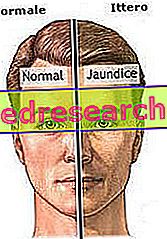See also: Eye color
Yellow eyes are a sign of liver malfunction. Often, when the white of the eye (called sclera) is tinged with this unpleasant color, the skin also shows the same shades. Doctors therefore speak of jaundice, a very common sign among patients with liver disease.
The yellow coloration of the eyes and skin is due to the accumulation of bilirubin, a substance deriving from the catabolism of aged red blood cells; under normal conditions, this yellow-orange pigment is processed by the liver, to then be partly eliminated with urine and partly with feces. When due to a hepatic malfunction, bilirubin circulating in the blood (bilirubinemia) exceeds 2-2.5 mg per 100 ml, the eyes and the skin turn yellow.

Causes of yellow eyes
The most frequent cause of jaundice and yellow eyes is also the least severe; it is a hereditary condition, called Gilbert's, which affects about 5-10% of the Caucasian population. Generally, this disease runs asymptomatically and the yellow eyes may appear more or less evident due to aggravating factors, such as severe stress, infections, prolonged fasting, intake of certain drugs (such as paracetamol) and intense physical exertion .
Scleral jaundice may also be a sign of other liver diseases of varying severity - such as cirrhosis, liver tumors, hepatitis, biliary atresia, fatty liver - or extrahepatic, such as pancreatitis, pancreatic tumors, biliary obstruction, sickle cell anemia (drepanocytic anemia), thalassemia and yellow fever (a tropical disease transmitted through mosquito bites). Therefore, if you notice that your eyes are turning yellow, report it to your doctor as soon as possible, especially when there are suspicious symptoms (weakness, fatigue, liver and abdominal pain, pallor, rapid weight loss, digestive disorders). A simple blood test will help confirm the origin of the "yellow eyes" symptom.
Melatonin abuse can also cause yellow eyes.



